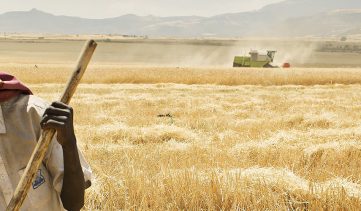Malawi has recently experienced great challenges to its food security situation. At the beginning of 2015, the country saw the worst flooding in its living memory, followed by delayed rainfall and prolonged dry spells. In addition to property damage and lives lost, the toll was heavy on food production, destroying tens of thousands of hectares of crop fields, and affecting more than one million people.
The crisis highlights the country’s continuing challenges of food and nutrition insecurity. While Malawi has made progress in recent years, it still ranks among the world’s least developed countries. Poverty remains high, only decreasing slightly since 2005, according to official estimates, 21 percent of the population remain hungry and 42 percent of children under five are stunted due to chronic undernutrition.
In the face of this challenges, the government has been forward-thinking and looking for new ideas to improve its food security and nutrition. The country is one of the initial Compact2025 focal countries, and Malawi’s Vice President, Saulos Chilima, has an active role in the Compact2025 Leadership Council.
“Vice President Chilima is very open and dedicated to improving policies that deliver nutritious foods to people,” IFPRI Director General Shenggen Fan said.
This commitment was clear from a high-level symposium Fan and IFPRI Head of Partnerships Teunis Van Rheenen attended during a visit to Malawi in October. Vice President Chilima gave opening remarks at the symposium on improving market policies for maize organized by IFPRI’s Malawi Strategy Support Program along with a group of key donor and research organizations including DFID, FAO, and Lilongwe University. IFPRI has a longstanding and close partnership with the Malawian government through its Malawi Strategy Support Program, working hand in hand to support the country’s goals of food security and poverty reduction particularly through growth in smallholder agriculture.
Maize is a strategic commodity in Malawi with an enormous influence on the economy, contributing one-third to the country’s GDP and responsible for 60 percent of Malawians’ calorie consumption. At the symposium, the vice president emphasized the crop’s vulnerability.
“It is imperative to underscore that maize market, like any other agricultural crop, is a haphazard market with high levels of uncertainty or predictability because its production is largely rain-fed,” Chilima said at the symposium. “When weather patterns are favorable, there is excess and therefore prices slump. When weather patterns are unfavorable, there is shortage of the commodity and prices boom.”
Fan, Van Rheenen, and Karl Pauw, head of IFPRI’s Malawi Strategy Support Program, later met with Vice President Chilima to further discuss the food security situation.
“He has openly said ‘our market has not worked; we need to improve it.’ That is very impressive.” Fan said. “Analyzing and addressing these types of issues are central to Compact2025’s activities. TBy working together, we can and will support Malawi’s endeavor to accelerate its fight against hunger and undernutrition.”



